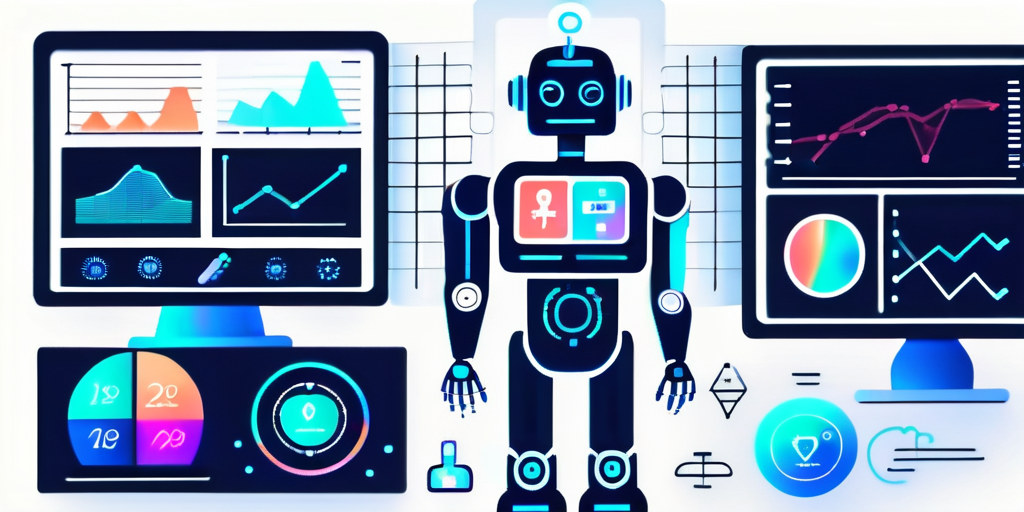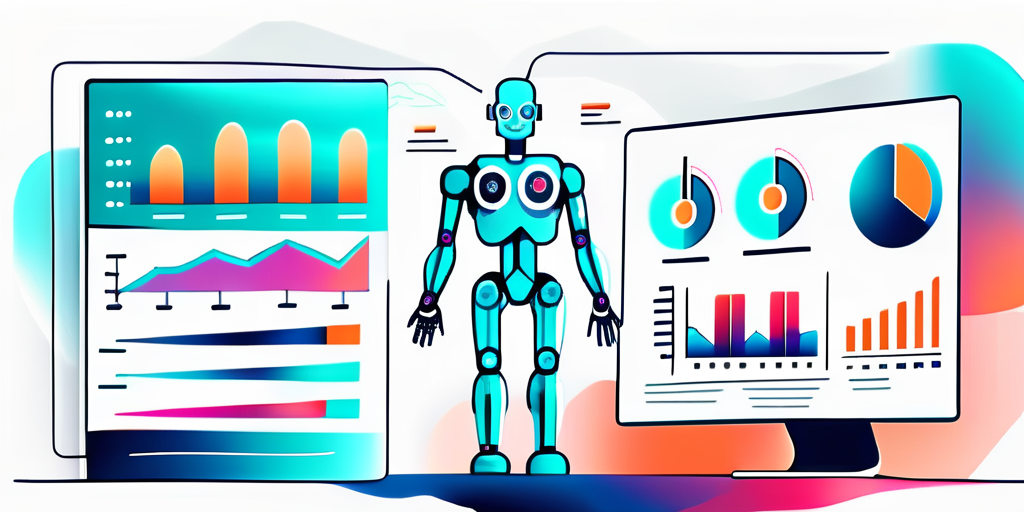Artificial Intelligence (AI) is revolutionizing the healthcare industry, playing a crucial role in analyzing healthcare indicators. As technology continues to advance at an unprecedented rate, AI is becoming increasingly powerful in uncovering hidden issues, improving patient care outcomes, and transforming the way healthcare data is analyzed.
Understanding the role of artificial intelligence in healthcare
The rise of AI in modern healthcare has opened up a world of possibilities. With its ability to process and analyze vast amounts of data, AI has the potential to revolutionize healthcare analysis and make significant advancements in patient care. By leveraging machine learning algorithms and predictive models, AI can identify patterns, detect anomalies, and provide valuable insights that were previously unattainable.
The rise of AI in modern healthcare
In recent years, the adoption of AI in healthcare has been on the rise. According to a survey conducted by Forbes, over 90% of healthcare executives believe that AI will play a critical role in the future of their organizations. The vast potential of AI lies in its ability to analyze complex healthcare data, including medical records, patient history, and treatment outcomes, to uncover hidden issues and improve patient care.
How AI is revolutionising healthcare analysis
Traditional healthcare analysis methods have often relied on manual processes and subjective interpretation of data. This approach is not only time-consuming but also prone to human errors. With the power of AI, healthcare analysis is undergoing a significant transformation. AI algorithms can quickly process large volumes of data, identify trends, and provide accurate predictions. This not only saves time but also enables healthcare professionals to make more informed decisions based on data-backed insights.
Moreover, AI is not limited to just analysis. It is also being used to enhance patient care in various ways. For instance, AI-powered chatbots are being employed to provide round-the-clock assistance to patients, answering their queries and providing basic medical advice. This not only improves patient experience but also reduces the burden on healthcare professionals, allowing them to focus on more complex tasks.
Additionally, AI is proving to be a valuable tool in medical research. By analyzing vast amounts of research data, AI algorithms can identify potential new drug candidates, predict disease outbreaks, and even help in the development of personalized treatment plans. This has the potential to revolutionize the field of medicine, leading to more targeted and effective treatments for patients.
The hidden issues in healthcare indicators
While healthcare indicators play a crucial role in assessing the overall health of a population, there are often hidden issues that traditional analysis methods fail to uncover. These hidden issues can have a significant impact on patient care outcomes and healthcare policies.
Delving deeper into the realm of healthcare indicators reveals a multitude of complexities that go beyond the surface-level data. Factors such as socio-economic background, access to healthcare services, and cultural beliefs can all influence the interpretation of healthcare indicators and the subsequent policies implemented. Understanding these nuances is essential for a comprehensive and effective healthcare system.
The challenges of traditional healthcare analysis
One of the major challenges of traditional healthcare analysis is the sheer volume and complexity of data. With the amount of data generated in healthcare increasing exponentially, manual analysis becomes impractical and error-prone. Additionally, traditional methods often overlook subtle patterns and correlations that AI algorithms can easily detect.
Furthermore, the dynamic nature of healthcare systems poses a challenge to traditional analysis methods. Changes in healthcare policies, advancements in medical technology, and shifts in population demographics all contribute to the complexity of healthcare data analysis. Adapting traditional methods to accommodate these changes requires a flexible and innovative approach.
The potential of AI in identifying hidden issues
AI has the potential to revolutionize healthcare indicator analysis by uncovering hidden issues that were previously undetectable. By analyzing vast amounts of data, AI algorithms can detect patterns and correlations that may not be apparent to human analysts. This can lead to earlier detection of diseases, more accurate diagnoses, and improved treatment plans.
Moreover, AI can assist in predictive analysis, forecasting potential healthcare issues before they escalate. By utilising machine learning algorithms, healthcare providers can proactively address underlying issues and allocate resources more efficiently. The integration of AI in healthcare analysis represents a significant step towards a more proactive and data-driven approach to healthcare management.
The intersection of AI and healthcare indicators
As AI continues to advance, its intersection with healthcare indicators becomes increasingly important. The ability of AI algorithms to analyze and interpret healthcare data has the potential to transform the way indicators are used in healthcare decision-making.
In recent years, the integration of AI technology in healthcare has shown promising results in various areas such as diagnostics, personalised treatment plans, and predictive analytics. This synergy between AI and healthcare indicators has paved the way for more efficient and accurate patient care, ultimately leading to better health outcomes for individuals.
AI’s approach to analyzing healthcare data
AI takes a data-driven approach to analyzing healthcare data. By leveraging machine learning algorithms, AI can identify hidden patterns and correlations that may not be immediately apparent. This allows healthcare professionals to gain deeper insights into patient populations, identify at-risk individuals, and develop targeted interventions.
Moreover, AI’s ability to continuously learn and adapt from new data inputs enhances its analytical capabilities over time. This iterative process enables AI systems to evolve and improve their accuracy in interpreting healthcare indicators, ultimately leading to more informed decision-making by healthcare providers.
The benefits of AI in healthcare indicator analysis
The benefits of using AI in healthcare indicator analysis are manifold. AI algorithms can process vast amounts of data in real-time, allowing for timely interventions and improved patient care outcomes. Furthermore, AI can help identify gaps in healthcare access and improve resource allocation, ensuring that healthcare services are delivered where they are needed most.
Additionally, the integration of AI in healthcare indicator analysis can streamline administrative processes, reduce healthcare costs, and enhance overall operational efficiency within healthcare systems. By automating routine tasks and providing data-driven insights, AI empowers healthcare professionals to focus more on patient care and clinical decision-making, ultimately enhancing the quality of healthcare services provided.
The future of AI in healthcare analysis
As AI continues to evolve, its role in healthcare analysis is expected to become even more prominent. Predictions for AI’s future in healthcare are incredibly optimistic, with experts forecasting dramatic improvements in patient care outcomes and healthcare delivery.
Predictions for AI’s role in healthcare
According to a report by Grand View Research, the global AI in healthcare market is projected to reach a staggering $31.3 billion by 2025. This demonstrates the immense potential and growing interest in integrating AI into healthcare analysis. Experts predict that AI will enable personalized medicine, facilitate early disease detection, and improve treatment outcomes by providing accurate and timely insights.
One area where AI is expected to have a significant impact is in radiology. With its ability to analyze large amounts of medical imaging data, AI algorithms can assist radiologists in detecting abnormalities and making more accurate diagnoses. This not only saves time but also improves patient outcomes by ensuring that potential issues are identified early on.
The potential impact on patient care and outcomes
The future impact of AI on patient care and outcomes is promising. With AI’s ability to analyze healthcare indicators and identify hidden issues, patients can receive more accurate diagnoses and personalized treatment plans. This not only improves patient satisfaction but also reduces healthcare costs and improves overall population health.
Furthermore, AI has the potential to revolutionize the field of drug discovery. By analyzing vast amounts of data, AI algorithms can identify patterns and predict the effectiveness of potential drug candidates. This has the potential to significantly speed up the drug development process, leading to the discovery of new treatments for various diseases.
In conclusion, the role of AI in analyzing healthcare indicators is transforming the way healthcare data is analyzed and patient care is delivered. As AI continues to advance, its ability to uncover hidden issues, provide valuable insights, and improve patient care outcomes is set to revolutionize the healthcare industry. Embracing AI in healthcare analysis is crucial for healthcare organizations striving to provide the best possible care to their patients.
As we stand on the brink of a healthcare revolution, the integration of AI into your clinic’s operations is no longer a futuristic concept—it’s a strategic imperative. At Clinic Marketing AI, we understand the transformative power of AI in healthcare. Our CEO, Angelo Rosati, brings a wealth of experience from the intersection of healthcare, marketing, and artificial intelligence to elevate your clinic’s performance to new heights. We’re not just about delivering results; we’re about achieving excellence together. If you’re ready to uncover the hidden issues in healthcare indicators and propel your clinic forward, Book a Call with Us today. Let’s embark on this journey to transform the future of Your Clinic.




